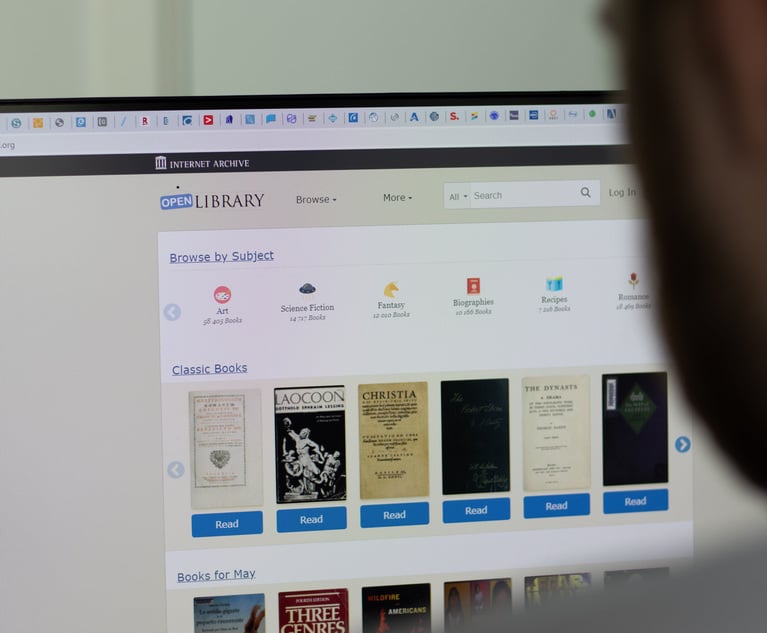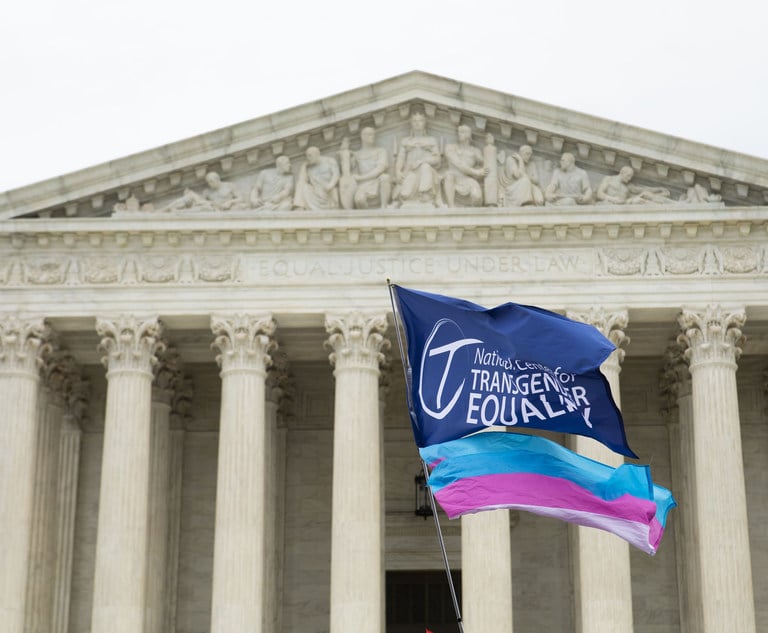Twists and Turns of Copyright Litigation Over Jersey Boys Musical Reach Latest Stage
Since 2007, the development of the musical has been the source of protracted litigation that reached its latest stage in June 2017.
July 07, 2017 at 03:52 PM
23 minute read
This article appeared in Entertainment Law & Finance, an ALM publication for Entertainment Law Practitioners, In-House Counsel at Entertainment Companies, Intellectual Property Practitioners. Visit the website to learn more.
The Four Seasons were a 1960's pop group whose rise to stardom also involved mob connections and a gang of hits, such as “Sherry,” “Big Girls Don't Cry” and “Walk Like a Man.” In 1990, the vocal group was inducted into the Rock & Roll Hall of Fame. In 2004, a musical play based on the lives of the Four Seasons opened. Called Jersey Boys, the musical moved to Broadway where it won four Tony awards. In 2014, Jersey Boys was adapted into a movie directed by Clint Eastwood. Since 2007, the development of the musical has been the source of protracted litigation that reached its latest stage in June 2017. Corbello v. DeVito, 2:08-cv-00867 (D. Nev.).
|Case Background
The Four Seasons consisted of Frankie Valli, Tommy DeVito, Bob Gaudio and Nick Massi. The intricate back story to the Jersey Boys litigation is that, in 1988, Rex Woodard, a Texas lawyer and a journalist, entered into a written agreement with DeVito to ghostwrite DeVito's autobiography. The agreement specified that Woodard and DeVito would be listed as co-authors of the book and equally divide the proceeds from publishing or otherwise exploiting it. The agreement also stated it would be binding on the parties' heirs. After completing the book manuscript, Woodard died of cancer in 1991. Four months before Woodard's death and without his knowledge, DeVito registered the book with the U.S. Copyright Office solely in his own name. In 1999, DeVito and Nick Massi executed an agreement with Frankie Valli and Bob Gaudio through which DeVito and Massi licensed the exclusive right to use their “biographies” to Valli and Gaudio for development of a musical play about the Four Seasons. In exchange, DeVito and Massi would each be entitled to receive a percentage of the income Valli and Gaudio obtained from the play. In 2004, Valli and Gaudio entered into an agreement with a theatrical production company that provided, in exchange for the right to use the Four Seasons' music and the band members' names, likenesses and life stories in a play, Valli and Gaudio would receive advances and royalties based on a percentage of the box office. After Jersey Boys debuted, pursuant to the 1999 agreement, Valli and Gaudio distributed a portion of the payments they received to DeVito. Unbeknownst to Woodard's widow Donna Corbello, Valli or Gaudio, in 2004 DeVito gave a copy of the Woodard/DeVito book to the play's writers. After Woodard's death, Corbello, along with Woodard's sister Cindy Ceen, unsuccessfully attempted to obtain a publisher for the book. In 2005, shortly before Jersey Boys opened on Broadway, Ceen contacted DeVito for assistance in seeking a publisher. DeVito rejected Ceen's overtures, telling her that the book was “not saleable,” but he did not disclose to Ceen or Corbello that he had any financial interest in Jersey Boys. By late 2006, Jersey Boys had become a Broadway hit. Corbello attempted to register the copyright in the Woodard/DeVito book but discovered that DeVito already registered the book in his own name. Corbello then filed a supplementary application with the U.S. Copyright Office, which issued an amended certificate of registration listing Woodard and DeVito as co-authors. In addition, Corbello also learned that the writers of Jersey Boys had relied on “an unpublished autobiography” by DeVito in writing the libretto and that some of the actors had been provided with a copy of the book as background material to prepare for their roles. Corbello sued DeVito in 2007 in a Texas federal court, which transferred to case to the District of Nevada, where DeVito resided. In 2008, Valli's divorce proceedings brought to light the 1999 agreement and other documents regarding DeVito's involvement in Jersey Boys. Corbello filed an amended complaint in 2011 alleging 20 causes of action, including copyright infringement, not only against DeVito but also against Valli, Gaudio and the writers, director and producers of the play. Corbello claimed Jersey Boys was a “derivative work” of the Woodard/DeVito book and that she was entitled to share in the play's profits. She claimed that Jersey Boys earned profits of approximately $300 million per year, with a life expectancy of at least 10 years, and that she was entitled to approximately $6.5 million. Both sides moved for summary judgment. Nevada federal District Judge Robert C. Jones ruled that Corbello and DeVito each owned 50% of the Woodard/DeVito book copyright. As to the dollar amount that DeVito was required to pay to Corbello, the district judge said there remained a question of fact as to what percentage of DeVito's royalties under the 1999 agreement were attributable to the book and what percentage was due to other assistance DeVito provided to Valli and Gaudio. The court found that the 1999 Agreement was a license authorizing Valli and Gaudio to use the book to develop the play, and that the 1999 agreement, the 2004 agreement and DeVito's subsequent conduct impliedly licensed Valli, Gaudio, and the writers and producers to create the play. Corbello appealed to the U.S. Court of Appeals for the Ninth Circuit, which reversed the district court by ruling that under the 1999 agreement DeVito had transferred his interest in the Woodard/DeVito book to Valli and Gaudio. As a result, Corbello, Valli and Gaudio became co-owners of the book's copyright. The court further found that Jersey Boys was a derivative work. Ordinarily, Corbello's copyright infringement claims against Valli and Gaudio would be precluded by law because a copyright co-owner cannot be liable to another co-owner for infringement. In such a case, Corbello would be entitled only to an accounting of Valli and Gaudio's profits. However, the 1999 agreement contained a reversion clause that may have terminated Valli and Gaudio's ownership rights in the Woodard/DeVito book as of December 2004, supporting Corbello's claim of copyright infringement for uses of the book thereafter. Because the factual record contained conflicting evidence regarding whether the reversion clause applied, the appeals court ruled that summary judgment was inappropriate on Corbello's infringement claims. Corbello v. DeVito, 777 F.3d. 1058 (9th Cir. 2015). On remand, the district court conducted a 15-day trial. (Corbello settled with DeVito with no objections from the other defendants.) At the close of Corbello's evidence, the defendants moved for judgment as a matter of law on all issues. District Judge Jones granted the motion in favor of Valli and Gaudio as to copyright infringement. In his written order on the ruling, Judge Jones explained there was no evidence that Valli and Gaudio were aware the play's writers copied any material from the Woodard/DeVito book to create Jersey Boys, nor did they have the ability to control the writers' activity. In fact, the trial evidence was unrebutted that neither Valli nor Gaudio even saw the book until their depositions in the case. Left as defendants were the Jersey Boys writers, director and producers. Judge Jones granted their motion on the issue of willful infringement, as there was no evidence that any defendant knew of or recklessly disregarded the possibility that copying from the Woodard/DeVito book infringed the copyright. In November 2016, the jury returned a verdict that found DeVito had not granted the writers and producers an implied license to use the book to create the musical. The jury also found that Jersey Boys infringed the book and that 10% of the success of the play was attributable the infringement. But in June 2017, Judge Jones granted the remaining defendants' motion for judgment as a matter of law based on fair use, and granted them a new trial on two issues: what percentage of the play's success may have been attributable to the Woodard/DeVito book and whether DeVito had given an implied license to the writers and producers. |Fair Use
On the fair use issue, Judge Jones found, among other things, that were the book to prove profitable, it would be only because of the Jersey Boys play's success. Thus, the play did not impair the potential market for the book. Judge Jones devoted most of his fair use inquiry to how much from the Woodard/DeVito book had been used by the defendants. He remarked that he had “painstakingly” compared the book to a DVD of a Broadway performance of Jersey Boys in calculating that over 50% of Jersey Boys consisted of songs in which Corbello had no interest and that the remainder of the play used less than 1% of the creative expression from the book. Judge Jones declared that, at most, the jury could have found about 145 words copied from the book into the play, whether as dialogue or creative descriptions of events. Those 145 words comprised about 0.2% of the Woodard/DeVito book's 68,500 words. Moreover, the court found the “heart” of the book was not Rex Woodard's writing style, but the unprotected historical facts conveyed by DeVito. Judge Jones concluded his fair use discussion with an examination of whether Jersey Boys was “transformative” by adding a different purpose or character to the expression contained in the book. With the book, Tommy DeVito had set out to inform by vindicating his perspective on the development of the Four Seasons and revealing hidden truths about the band. In contrast, the purpose of the play was to entertain. But even if the purpose of the play were to inform, Judge Jones noted, the play took on a different character from the book by incorporating DeVito's perspective into a more complete and balanced description of events based on the experiences of the Four Seasons members. (Judge Jones identified Tommy DeVito as “the only bad actor” in the case. In a footnote, the district judge said that DeVito deceived Donna Corbello regarding his copyright registration and licensing of the Woodard/DeVito book, and had deceived Valli, Gaudio and the other defendants as to his alleged sole authorship of the book.) |Implied License Issue
After a jury trial, a federal district court may grant a new trial if the verdict is against the clear weight of the evidence. Judge Jones stated he was “compelled” to find this to be the case because the evidence presented at trial could not support the jury's finding that 10% of Jersey Boys' success was due to copying protected elements of the Woodard/DeVito book. In reviewing the jury's finding that DeVito did not grant the defendants an implied nonexclusive license to use the book to develop the play, Judge Jones explained that in the 1999 agreement DeVito gave an express license to Valli and Gaudio to use the book in creating and producing a play, but that license terminated by its own terms in Dec. 10, 2004, before the play debuted. Therefore, despite the fact that DeVito had given a copy of the book to the play's writers in January 2004 (during the term of the express license), a question remained as to whether DeVito continued to authorize production of the play after Dec. 10, 2004. The evidence of an implied license was DeVito's attendance at the play in La Jolla, CA, in 2004 (presumably in try-out performances) and when it opened on Broadway in 2005, as well as his receipt of royalties without objection. Unfortunately, Judge Jones conceded, despite the fact that the Ninth Circuit had remanded the implied license issue for trial, neither the evidence, the parties' closing arguments, or the court's instructions to the jury had focused on these DeVito facts. So a new trial would have been required on the implied nonexclusive license issue, as well as any damages award, but Judge Jones directed the clerk to close the case. |June 2017 Order
On first reading, Judge Jones's June 2017 order may seem puzzling. Having granted the defendants' motion for judgment as a matter of law on the defense of fair use, why did the court consider their motion for a new trial? Was the court's resolution of the new trial motion an exercise in dicta? Or was Judge Jones simply being thorough, out of an abundance of caution? In my interview of Corbello defense counsel David Korzenik for this article, he maintained that Judge Jones had to decide both the judgment-as-a-matter-of-law and new-trial motions that were before him, even if the new trial motion was secondary. Thus, the district judge was required “to address all the issues before him, even if some were dispositive and the others were, at that stage, moot.” Also of significance to copyright practitioners was the district court's refusal to count the unpublished nature of the book as a factor that weighed against fair use. Corbello's evidence regarding her unsuccessful efforts to find a publisher proved detrimental to her cause, as this led the court to the harsh conclusion that the book was “ultimately not commercially publishable.” Parties relying on the unpublished nature of a work to oppose a fair use defense must be wary of the difference between a work that has remained unpublished at the insistence of the author and a work that has simply failed to be accepted by a publisher. ***** Vincent Peppe is an attorney based in Nashville, TN, and a Music Business faculty member at Belmont University. He can be reached at [email protected].This article appeared in Entertainment Law & Finance, an ALM publication for Entertainment Law Practitioners, In-House Counsel at Entertainment Companies, Intellectual Property Practitioners. Visit the website to learn more.
This content has been archived. It is available through our partners, LexisNexis® and Bloomberg Law.
To view this content, please continue to their sites.
Not a Lexis Subscriber?
Subscribe Now
Not a Bloomberg Law Subscriber?
Subscribe Now
NOT FOR REPRINT
© 2024 ALM Global, LLC, All Rights Reserved. Request academic re-use from www.copyright.com. All other uses, submit a request to [email protected]. For more information visit Asset & Logo Licensing.
You Might Like
View All
Florida Court Rules in Favor of Production Co. in Dispute Over Viral Documentary 'Died Suddenly'


Court rejects request to sideline San Jose State volleyball player on grounds she’s transgender
4 minute read
Netflix Offices Raided by Authorities in Paris and Amsterdam
Trending Stories
- 1Call for Nominations: Elite Trial Lawyers 2025
- 2Senate Judiciary Dems Release Report on Supreme Court Ethics
- 3Senate Confirms Last 2 of Biden's California Judicial Nominees
- 4Morrison & Foerster Doles Out Year-End and Special Bonuses, Raises Base Compensation for Associates
- 5Tom Girardi to Surrender to Federal Authorities on Jan. 7
Who Got The Work
Michael G. Bongiorno, Andrew Scott Dulberg and Elizabeth E. Driscoll from Wilmer Cutler Pickering Hale and Dorr have stepped in to represent Symbotic Inc., an A.I.-enabled technology platform that focuses on increasing supply chain efficiency, and other defendants in a pending shareholder derivative lawsuit. The case, filed Oct. 2 in Massachusetts District Court by the Brown Law Firm on behalf of Stephen Austen, accuses certain officers and directors of misleading investors in regard to Symbotic's potential for margin growth by failing to disclose that the company was not equipped to timely deploy its systems or manage expenses through project delays. The case, assigned to U.S. District Judge Nathaniel M. Gorton, is 1:24-cv-12522, Austen v. Cohen et al.
Who Got The Work
Edmund Polubinski and Marie Killmond of Davis Polk & Wardwell have entered appearances for data platform software development company MongoDB and other defendants in a pending shareholder derivative lawsuit. The action, filed Oct. 7 in New York Southern District Court by the Brown Law Firm, accuses the company's directors and/or officers of falsely expressing confidence in the company’s restructuring of its sales incentive plan and downplaying the severity of decreases in its upfront commitments. The case is 1:24-cv-07594, Roy v. Ittycheria et al.
Who Got The Work
Amy O. Bruchs and Kurt F. Ellison of Michael Best & Friedrich have entered appearances for Epic Systems Corp. in a pending employment discrimination lawsuit. The suit was filed Sept. 7 in Wisconsin Western District Court by Levine Eisberner LLC and Siri & Glimstad on behalf of a project manager who claims that he was wrongfully terminated after applying for a religious exemption to the defendant's COVID-19 vaccine mandate. The case, assigned to U.S. Magistrate Judge Anita Marie Boor, is 3:24-cv-00630, Secker, Nathan v. Epic Systems Corporation.
Who Got The Work
David X. Sullivan, Thomas J. Finn and Gregory A. Hall from McCarter & English have entered appearances for Sunrun Installation Services in a pending civil rights lawsuit. The complaint was filed Sept. 4 in Connecticut District Court by attorney Robert M. Berke on behalf of former employee George Edward Steins, who was arrested and charged with employing an unregistered home improvement salesperson. The complaint alleges that had Sunrun informed the Connecticut Department of Consumer Protection that the plaintiff's employment had ended in 2017 and that he no longer held Sunrun's home improvement contractor license, he would not have been hit with charges, which were dismissed in May 2024. The case, assigned to U.S. District Judge Jeffrey A. Meyer, is 3:24-cv-01423, Steins v. Sunrun, Inc. et al.
Who Got The Work
Greenberg Traurig shareholder Joshua L. Raskin has entered an appearance for boohoo.com UK Ltd. in a pending patent infringement lawsuit. The suit, filed Sept. 3 in Texas Eastern District Court by Rozier Hardt McDonough on behalf of Alto Dynamics, asserts five patents related to an online shopping platform. The case, assigned to U.S. District Judge Rodney Gilstrap, is 2:24-cv-00719, Alto Dynamics, LLC v. boohoo.com UK Limited.
Featured Firms
Law Offices of Gary Martin Hays & Associates, P.C.
(470) 294-1674
Law Offices of Mark E. Salomone
(857) 444-6468
Smith & Hassler
(713) 739-1250






